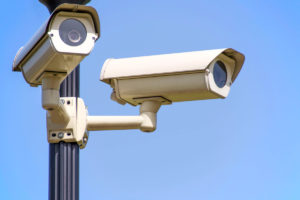Big retail stores across the nation rely primarily in technology to prevent shoplifting according to industry analysts. The physical loss prevention officers of long ago, are quickly being replaced by technology in the stores. The interpretation and study of the data obtained fighting shoplifting and employee theft are invaluable during these times.
While smaller stores rely on locking freezers to protect their merchandise, that is not feasible for most other stores. Smaller stores need to understand the problem, and find a solution that is reasonable for them.
For more about this and other stories, follow the links below.
Retailer forced to use bike lock on chillers to prevent shoplifting
A Coventry convenience retailer has been forced to fit a bicycle chain lock on his chiller doors to prevent shoplifting after it cost him £12,000 last year.
Paul Cheema, owner of Malcolm’s Store, said as well as the bike lock, he had put bells on the chillers. He said the store had been targeted by gangs stealing large amounts of meat and cheese.
Speaking to Radio 4’s You and Yours, Cheema said: “One man took 32 packs of bacon and 20 packs of cheese. We put bicycle chains and doorbells on our fridges so every time a door opens an alarm sounds.”
He added that he was using social media to post pictures of suspects.
Eyes open: Catching shoplifters takes vigilance, prevention
When a retailer sees someone suspicious wandering the aisles, they can’t just call police.
Acting shady in a store isn’t illegal. Neither is putting an item in your pocket.
Under North Dakota law, an item must be taken past the last point of sale before it is considered stolen.
Jerry Cox, a regional manager for Valley Dairy in Grand Forks, said employees at their nine area convenience stores are trained to watch for shoplifters.
Often, he said, a shoplifter will pocket some items and purchase others. If an employee sees someone tuck something away between the aisles, they have to give the person every chance to pay. The clerk often will ask if there’s anything else they want.
“You have to assume they’re honest,” Cox said.
Using technology in today’s loss prevention career environment
“You don’t have to be an IT guy to understand cyber security, and it’s critical that you have enough of an understanding to know what questions to ask”
As an adjunct professor for AMU’s Center for Applied Learning, Dr. Robert Pittman imparts wisdom to next-generation loss prevention leaders, for whom he has the following warning—you can never “complete” your education. The world, risks, and business are always changing and loss prevention practitioners, and the loss prevention industry as a whole, must continually adapt. If not, individuals will find their career paths limited and the industry itself—just now gaining a seat at the management table—could be pushed to the background.
Today’s major retail operations are driven by technology, and entire supply chains rely on how effectively it is managed. Loss prevention practitioners need to have the skills to effectively navigate this tech-based environment if they want to advance their careers and help the LP industry thrive, Pittman believes. “Loss prevention used to be about focusing on the shoplifter in the store, but that’s completely changed. Those strictly physical security guys are quickly becoming extinct,” he said.

 According to the National Association for Shoplifting Prevention-NASP-there are 27 million people that shoplift in the United States today. That is 1 in 11
According to the National Association for Shoplifting Prevention-NASP-there are 27 million people that shoplift in the United States today. That is 1 in 11 How did your retail business do in 2016? Face it, regardless of how well you did or did not do, you could have done much better. The key is to keep your cash, assets and merchandise on YOUR bottom line not someone else’s. Thieves take the money you could have had away, easily in some cases.
How did your retail business do in 2016? Face it, regardless of how well you did or did not do, you could have done much better. The key is to keep your cash, assets and merchandise on YOUR bottom line not someone else’s. Thieves take the money you could have had away, easily in some cases.
 If you were asked what area of your store would present the most opportunity for employee theft and fraud, what would you answer? The checkout lanes where cashiers have access to the register, the ability to pass merchandise,
If you were asked what area of your store would present the most opportunity for employee theft and fraud, what would you answer? The checkout lanes where cashiers have access to the register, the ability to pass merchandise,
 Light-When someone is looking to do no good to your property, they feel more secure if it looks like no one is home. The key is to confuse them and make them feel unsure. Remember, most burglars are lazy. If they are not sure about your house, they will move on. So you should have at least two light timers (three is better) set up and running seven days a week. These should be in different areas of the home and should come on and off at different times. Use the random or security feature found on most timers. This will vary the on/off time every day just a little in case someone is watching the house for a pattern.
Light-When someone is looking to do no good to your property, they feel more secure if it looks like no one is home. The key is to confuse them and make them feel unsure. Remember, most burglars are lazy. If they are not sure about your house, they will move on. So you should have at least two light timers (three is better) set up and running seven days a week. These should be in different areas of the home and should come on and off at different times. Use the random or security feature found on most timers. This will vary the on/off time every day just a little in case someone is watching the house for a pattern.  Have you been keeping up with the news? It appears the stock market is on the verge of breaking new records. People are gaining confidence now that some economists are expressing optimism that we are about to see a jump start in economic growth. Does that mean EVERYONE is going to benefit? Unfortunately, the answer is no. There are many people who will continue to work in their current jobs and experience little personal benefit in their own eyes. What do I mean, “In their own eyes?” Just this, there are some people who are not satisfied with their job, or financial situation, or any number of things in their life and do little or nothing to try to change that. What they WILL do is get jealous when they see others who do well. It may be a co-worker who gets a promotion, a friend who has received a pay raise, a relative who has purchased a new car, there are lots of things that people can get jealous over. Sometimes this jealousy turns into an attitude of “Keeping up with the Jones’s” and can result in someone engaging in dishonest activity so they can have new things too. Frequently those who steal because they haven’t gotten that raise or promotion will try to justify their actions by rationalizing that they deserve it and aren’t being recognized for their contributions.
Have you been keeping up with the news? It appears the stock market is on the verge of breaking new records. People are gaining confidence now that some economists are expressing optimism that we are about to see a jump start in economic growth. Does that mean EVERYONE is going to benefit? Unfortunately, the answer is no. There are many people who will continue to work in their current jobs and experience little personal benefit in their own eyes. What do I mean, “In their own eyes?” Just this, there are some people who are not satisfied with their job, or financial situation, or any number of things in their life and do little or nothing to try to change that. What they WILL do is get jealous when they see others who do well. It may be a co-worker who gets a promotion, a friend who has received a pay raise, a relative who has purchased a new car, there are lots of things that people can get jealous over. Sometimes this jealousy turns into an attitude of “Keeping up with the Jones’s” and can result in someone engaging in dishonest activity so they can have new things too. Frequently those who steal because they haven’t gotten that raise or promotion will try to justify their actions by rationalizing that they deserve it and aren’t being recognized for their contributions.
 In the previous article, I gave some great tips on how to prevent and prepare for a robbery. Like many things, it’s impossible to provide a solution that is all encompassing. After I penned that article I couldn’t help but think that there was more that I could share; more that I should share. I draw on over a decade’s time spent in the LP field and this is one of those topics that I just can never stress enough to my store managers. So, what else can you do to limit a robbery and/or cash loss?
In the previous article, I gave some great tips on how to prevent and prepare for a robbery. Like many things, it’s impossible to provide a solution that is all encompassing. After I penned that article I couldn’t help but think that there was more that I could share; more that I should share. I draw on over a decade’s time spent in the LP field and this is one of those topics that I just can never stress enough to my store managers. So, what else can you do to limit a robbery and/or cash loss?